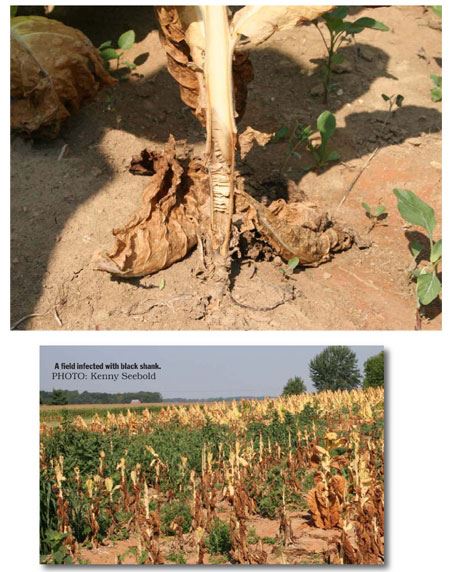Hot, Dry Weather Exacerbating Black Shank
LEXINGTON, KY.
In the past few weeks, plant pathologists at
the University of Kentucky College of Agriculture
have seen numerous cases of black
shank. Hot, dry conditions this summer likely
are to blame.
Black shank is the biggest annual disease
threat to Kentucky tobacco. The black shank
pathogen attacks a plant’s roots and stem and
causes dark-brown to black lesions. While the
black shank pathogen is most active during wet,
warm weather, dry weather can exacerbate the
disease.

“Plants infected with black shank can’t pull
water from the ground as effectively as healthy
plants, so they just die when it gets hot or dry,”
said Kenny Seebold, UK extension plant pathologist.
“Wilting and death can be so sudden that
plants remain green when they die, not showing
the yellowing that is characteristic of black
shank. The classic
blackening of the
stem from which
black shank takes
its name can be
less pronounced
as well during a
drought because
of the quick disease
cycle.”
The pathogen
likely would have
infected plants
earlier in the
growing season
when the soil
moisture was
higher, just before
or immediately
after a rain event
at setting, Seebold
said.
Scientists have developed many black shank
resistant varieties over the years to help combat
this disease. Even though a plant may be resistant,
it doesn’t mean it’s immune. This year
is a prime example.
“Tobacco with little or no black shank resistance
will die in wet or dry weather, but resistant
varieties can tolerate the disease to some extent
as long as they don't get water-stressed,” Seebold
said. “In years like this one, we see a lot of
disease in fields planted to resistant varieties.”
Producers who are unsure whether they have
black shank should take a plant sample to their
county’s extension office for identification.
Fungicides are available to reduce the risk of
spreading black shank to healthy plants, but
they should only be applied if there is good soil
moisture and if the tobacco is not past the layby
stage, Seebold said. Δ